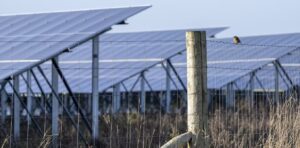A day away from the release of the Finkel Review, and the difficulties faced by the Chief Scientist in trying to steer Australia through what he calls the “unstoppable” energy transition, and to a bipartisan deal of climate and energy policies, are in stark relief.
Over the last few days, a whole bunch of businesses, business groups and others have come out in support of the still yet-to-be-defined “low emissions target” that is said to be the favoured policy outcome of the review.
But one wonders what it is that many of these businesses are expecting an LET to be. Listening to Paul O’Malley, the CEO of Bluescope Steel, (pictured above) it certainly isn’t a focus on climate policy or renewable energy.
“It’s really easy, if we don’t want jobs in Australia, let’s make emissions reduction a number one priority,” O’Malley said on Radio National on Thursday morning.
“Everything that Australians consume will be produced overseas and we will import it here. And people overseas will have jobs and say we’re doing a great job supplying Australia because they’re not allowed to have industry.”
And, for good measure, he added later: “By picking one aspect only (such as the RET)…. they’re basically telling our kids they shouldn’t have jobs in Australia, they need to go overseas.”
Hardly the balanced approach to energy policy that some might have expected. O’Malley claimed that he wanted “reliable, affordable and secure energy” that meets “appropriate emissions targets.”
One wonders what he thinks that is, given that the modelling commissioned by the Climate Change Authority , calibrated to fit in with the Paris climate targets that Australia has embraced, suggest a dramatic change in energy infrastructure, away from base-load coal, within the next two decades with pretty much every policy option.
Does the scare-mongering sound familiar? The fear is that a “low emissions target” policy, like the carbon price before it in the form of a CPRS, can be diluted and bastardised to fit in with the “politics” of the day.
Yet, it is the climate targets, and the plunging cost of wind, solar and storage that the Finkel review needs to address. Any half-arsed policy measures will simply make things worse.
Already, the conservatives and the industrialists are fighting back.
As we reported on Wednesday, leading Murdoch commentator Judith Sloan did a dramatic back-flip on her support for an LET. This was preceded by a volley of objections from the mining industry, and was quickly followed by former prime minister Tony Abbott.
As we write in more detail here, the Finkel Review’s biggest goal must be to try and change the conversation about the energy industry.
It will look like nothing that anyone has seen before. But only then, can serious discussion take place about the appropriate policy measures.











